We may earn revenue from the products available on this page and participate in affiliate programs. Learn More ›
Shower plants are a fun and popular trend. And why not? Indoor plants grow better in the higher humidity of a bathroom. Plus, they look great, help filter indoor air, and are convenient—you don’t even have to move the plants in the shower to water them.
But you can’t put just any plant into any shower and make it work. A drought-resistant cactus, for instance, would make a poor shower plant. To make this work, you should consider lighting, plant size, and water needs.
If you have tons of natural light coming through a large, south-facing bathroom window, you’ll want light-loving plants. For a bathroom with a north-facing window, add low-light plants instead. Adding plants in a bathroom with no natural light is doable with only a few select plants or as a part-time plant home for a few days at a time.
The size of your shower likely will limit the size of the plant. Many shower spaces are limited to small plants that can hang from a suction cup hook or sit on a shelf. If you have an open 0r walk-in shower, however, why not have larger plants and small trees?
The best plants for bathroom decor can handle the moist conditions of that environment. They aren’t sensitive to water droplets lying on their leaves. Those in pots can tolerate constant moisture around their roots. Epiphytic plants, which grow in trees and thrive on humidity and rainwater, are especially good choices.
Ready to turn your bathing area into a jungle paradise? Here are 12 plants you can grow successfully in the shower.
1. Air Plants (Tillandsia spp.)

Air plants are epiphytes. They need bright, indirect light and high humidity. Even better, they don’t use soil. Instead, air plants grow high in trees where they get all of their water needs from rainfall and moist air. They’re so light, you can get creative with containers in the shower area.
RELATED: 10 Plants You Can Grow Without Soil
2. Moth Orchids (Phalaenopsis spp.)
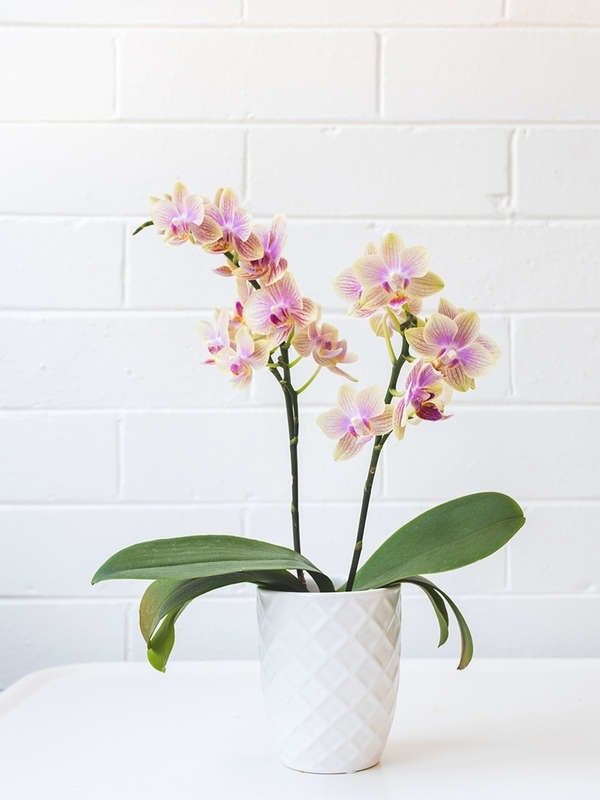
Moth orchids are beautiful; they’re also epiphytic plants that are great for the shower. Like air plants, they prefer bright, indirect light and grow naturally in crooks and hollows of trees. They thrive on ambient humidity and rainwater that collects in accumulated organic matter. In your shower, moth orchids grow well in small containers—they prefer to be rootbound—filled with orchid mix made of coarse bark.
3. Earth Stars (Cryptanthus spp.)

Earth stars are bromeliads grown for their interestingly patterned foliage. They live naturally on tropical forest floors where low light and high humidity are the rule. In the shower, simply ensure they have a bit of water collected in the cups where the leaves attach to the plant; it’s that easy.
4. Staghorn Fern (Platycerium bifurcatum)

Another epiphyte, staghorn fern grows naturally on the sides of trees, where the plant receives indirect, medium-to-bright light and lots of humidity. In your shower, staghorn fern will grow well on a “plaque.” You can buy the plants already mounted for wall hanging, or do it yourself by creating a bed of sphagnum moss on a cedar board and wiring the fern in place. Keep it moist—that’s it.
RELATED: Staghorn Fern Care: Mastering This Exotic, Easy-to-Grow Conversation Piece
5. Lucky Bamboo (Dracaena sanderiana)

Lucky bamboo is not really bamboo (and is questionably lucky), whi, but it is easy to grow in the shower. This cane plant is notorious for its ability to grow in water only and in low to bright light. Place one or more lucky bamboo canes in a tall vase, add pebbles as anchors, and fill the container with distilled or filtered water.
6. Spider Plant (Chlorophytum comosum)
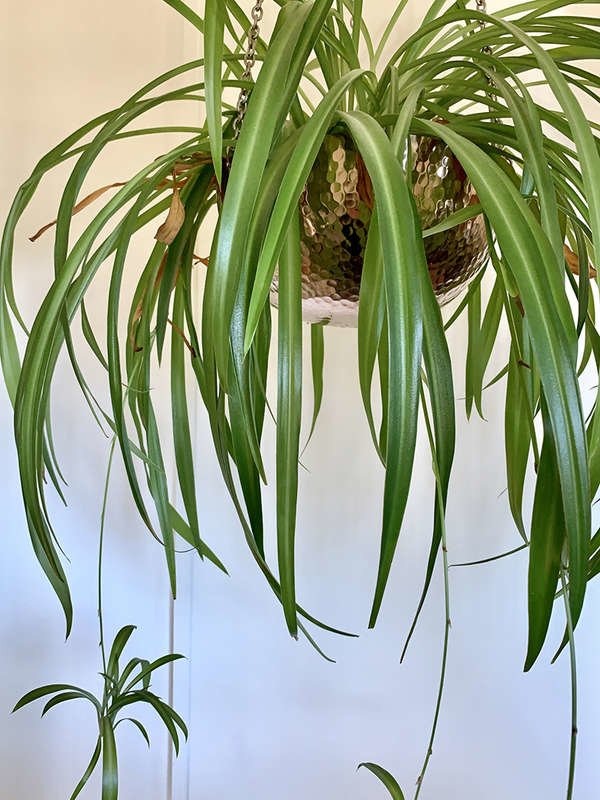
One of the easiest of all houseplants to grow under any circumstances, a spider plant also is a great choice for the shower. Initially looking like “grassy” clumps of foliage, spider plants begin sending out shoots as they mature; baby plants soon grow from the shoots. Allow the baby plants to stay on for a trailing effect, or trim them back and start new plants. Spider plants tolerate low to bright light.
7. Calathea (Calathea spp.)
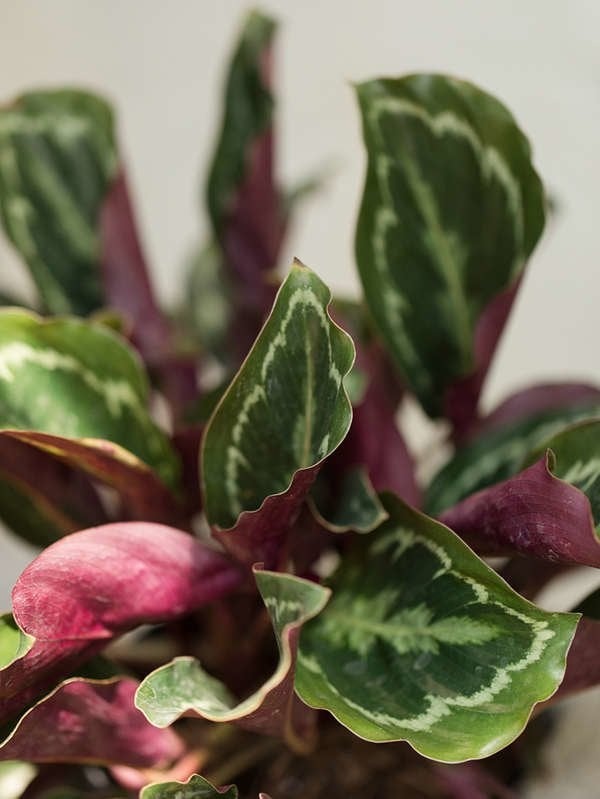
Low light and high humidity are the recipe for success with calathea, which is why they make great bathroom plants. Grow these colorful foliage plants on a shelf when they are young, and move them into larger pots on the floor as they mature.
8. Pothos (Epipremnum aureum)
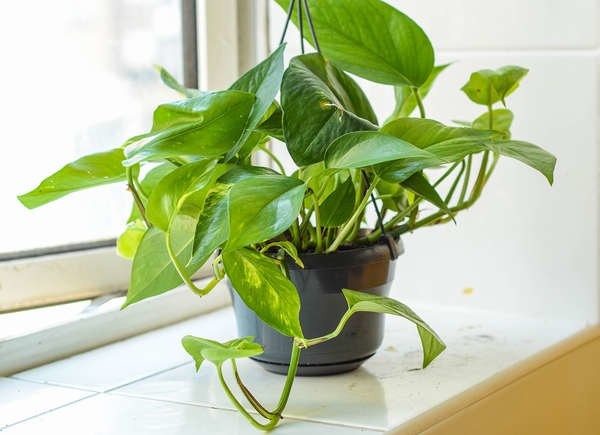
In the bathroom, hanging plants keeps them from getting too wet—and can add to a wild, natural vibe. Pothos is a super easy houseplant to grow and a trailing plant that’s a great candidate for hanging in the shower. Plant a pot of pothos in a medium-light or bright corner. Train the trailing stems along suction cup hooks for lush coverage. Pothos absorbs moisture from the air and needs only occasional supplemental watering.
RELATED: 10 Pothos Varieties for Your Easy-Care Houseplant Collection
9. Peace Lily (Spathiphyllum spp.)
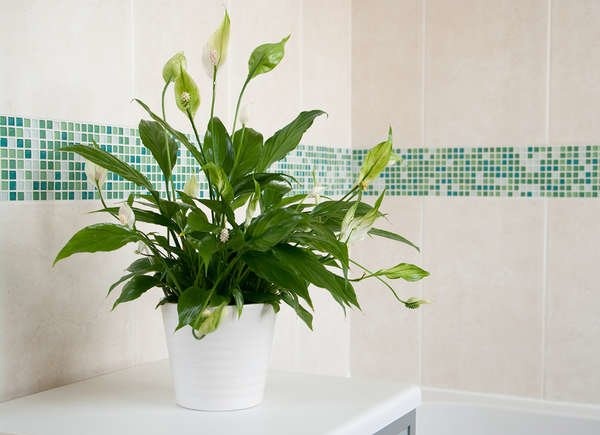
Few plants give the lush tropical look of peace lilies with their large, glossy, deep green leaves. They love humidity and moist soil, making them excellent plants in the shower. Peace lily plants are best for low- or medium-light locations.
RELATED: 14 Symptoms of an Unhappy Houseplant (and How You Can Treat Them)
10. Peperomia (Peperomia spp.)
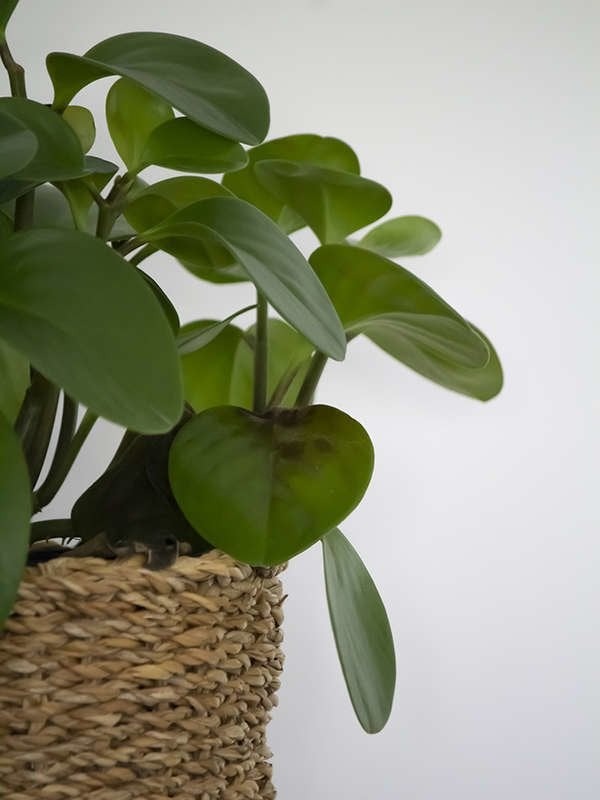
A small plant that thrives in low light, peperomia is another great plant for the shower. It does not require frequent watering, but responds well to high humidity. Keep peperomia in an elevated spot to avoid overspray when showering.
11. Pitcher Plant (Nepenthes spp.)

Bright light-loving pitcher plants are some of the showiest carnivorous plants. They like consistent soil moisture but dislike being soggy, so provide a well-draining container. Nepenthes have large, colorful pitcher-shaped insect traps that spill over the sides of their containers. You won’t need to feed them bugs; they do just fine on their own.
RELATED: It’s Not Me, It’s You: The 15 Toughest Houseplants to Keep Alive
12. Heartleaf Philodendron (Philodendron scandens)
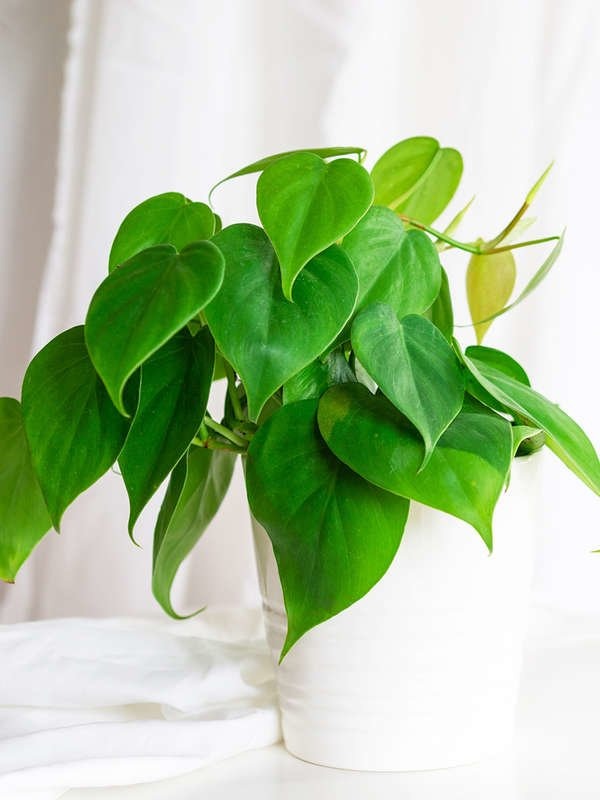
Heartleaf philodendrons loves low light, damp soil and high humidity, which makes them perfect shower plants. Let it dry out between waterings, and then water well when needed. Keep a philodendron full and bushy by pinching back the growing tips, or allow the tips to grow out and trail over the sides of the pot.


